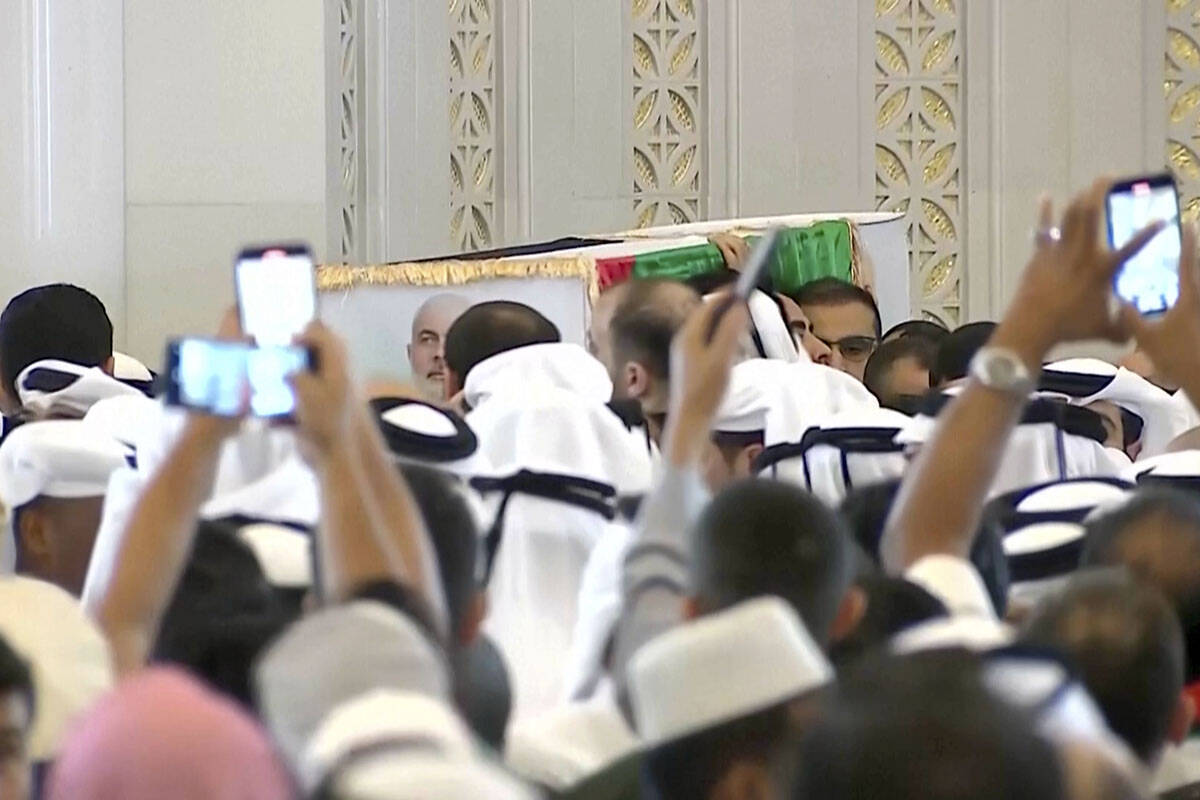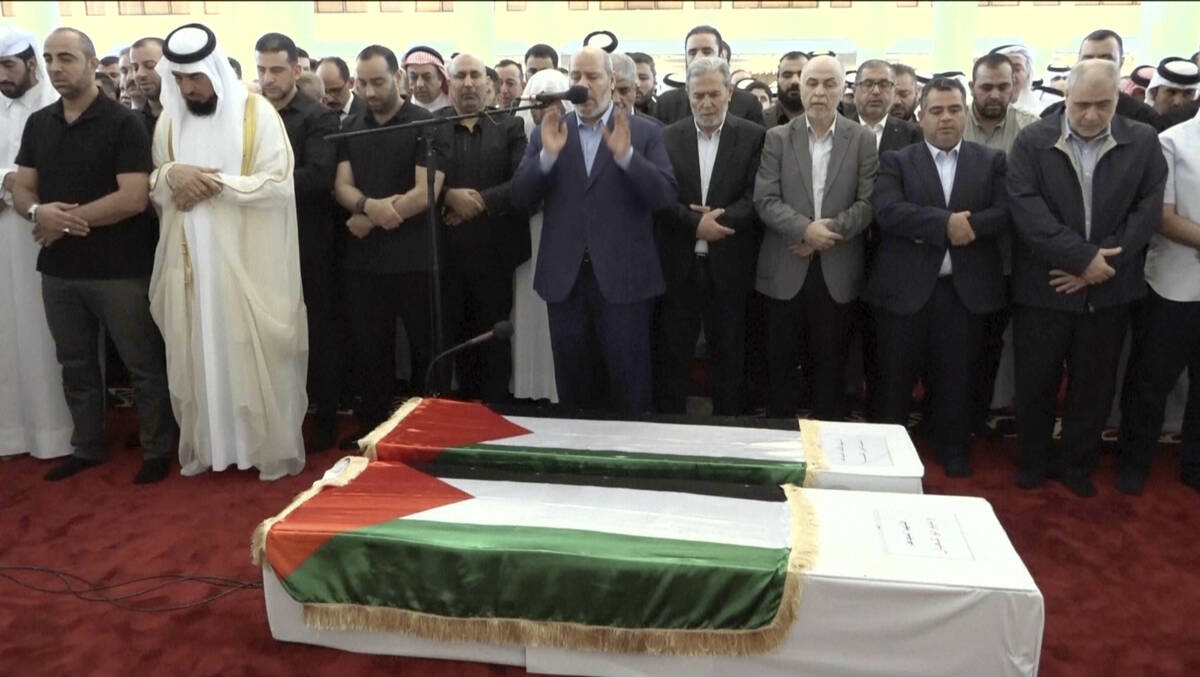Mourners bury Hamas chief Haniyeh in Qatar
JERUSALEM — Thousands of mourners converged around the flag-draped coffin of Hamas’ slain political chief, Ismail Haniyeh, in the emirate of Qatar on Friday as the fallout surged from his death in an alleged Israeli attack.
The funeral ceremony in Doha, Qatar’s capital, attended by members of Gaza’s Hamas and Islamic Jihad terrorist groups, as well as Qatari and Iranian officials, was subdued. But across the Muslim world — from Jordan and Morocco to Yemen and Somalia — angry crowds waving Palestinian flags rushed out of mosques after midday Friday prayers, chanting for revenge.
“Let Friday be a day of rage to denounce the assassination,” said Izzat al-Risheq, a senior Hamas official. Haniyeh had lived in Qatar, along with other senior members of Hamas’s political leadership.
Following the back-to-back assassinations of Haniyeh in Tehran early on Wednesday and top Hezbollah commander Fuad Shukr in Beirut the evening before, international diplomats have scrambled to head off a full-fledged regional war. Iran and its regional proxies vowed to retaliate. Major airlines canceled flights to Tel Aviv, Israel and Beirut, Lebanon.
France on Friday beefed up security for Jewish communities nationwide. Poland warned its citizens against traveling to the Mideast. Pakistan and Turkey lowered their flags to half-staff, prompting Israel to summon Turkey’s deputy ambassador for a “stern reprimand.”
Turkey’s foreign ministry spokesperson Oncu Keceli shot back that Israel “cannot achieve peace by killing the negotiators” — a reference to Haniyeh’s role in the cease-fire talks — as hundreds of Turks gathered at the historic Hagia Sophia to pay tribute to the slain Hamas leader as his funeral service got underway in Doha.
Israel has not confirmed or denied its role in the targeted killing of Haniyeh. On Thursday, Israel announced that it killed the shadowy leader of Hamas’ military wing, Mohammed Deif, in a July airstrike. Hamas had previously claimed Deif survived last month’s targeted airstrike in the besieged Gaza Strip, where the deadly pattern of Israeli airstrikes and skirmishes continued this week, with 15 Palestinians killed when a Gaza City school was hit on Thursday.
Tensions were also running high on Israel’s northern border days after Israel claimed responsibility for killing Shukr, the Hezbollah commander. On Friday, Hezbollah claimed a series of rocket and artillery attacks on Israel, causing a fire but no casualties in an evacuated Israeli town. Israel claimed its warplanes struck two Hezbollah militants in southern Lebanon who it said had fired the volley of rockets.
The exchange was more of the same tit-for-tat that have flared along the Lebanese-Israeli border throughout the Israel-Hamas war. But Israelis and Lebanese were bracing for more after Hezbollah leader Hassan Nasrallah on Thursday declared that the Shukr’s assassination in the southern suburbs of Beirut had pushed the war into a “new phase.”
From Jerusalem, Sheikh Ikrima Sabri, the imam of the holy Al-Aqsa Mosque, mentioned “the martyr Ismail Haniyeh” in his weekly sermon to the thousands of Palestinian worshippers who had come to Friday prayers.
“We ask God Almighty to have mercy on him and to grant him a place in His spacious gardens,” the imam said, adding that the Palestinians in Jerusalem were mourning the late Hamas leader.
Sheikh Sabri was promptly arrested. The Israeli police said they were interrogating him on charges of incitement to violence. “My policy towards instigators is clear — zero tolerance,” far-right Israeli National Security Minister Itamar Ben-Gvir posted on X.
Across the region, vows by Iran’s supreme leader, Ayatollah Ali Khamenei, that Israel would pay the price for killing Haniyeh on Iranian soil quickly led to calls for intense diplomacy to prevent further escalation.
Late on Thursday, President Joe Biden urged Israeli Prime Minister Benjamin Netanyahu to seize the chance for a cease-fire and “move on it now.” Netanyahu has sought to portray the recent striking of Hamas leaders as bringing Israel closer to a deal that would free the remaining Israeli hostages held in Gaza. Their distraught families rallied Thursday in Tel Aviv to mark the bitter milestone of 300 days of their captivity.
Tor Wennesland, the U.N. special coordinator for the Mideast peace process, said he was racing to work with Lebanon, Qatar, Egypt and other powers to “prevent a spillover of the conflict.”
U.K. Defense Secretary John Healey and Foreign Secretary David Lammy visited Israel on Friday “to push for an immediate cease-fire and drive de-escalation in the Middle East” while Israeli Defense Minister Yoav Gallant said he spoke with his American counterpart, Defense Secretary Lloyd Austin.
“The unprecedented security cooperation between Israel and the United States against Iran and its proxies is critical,” Gallant said.























